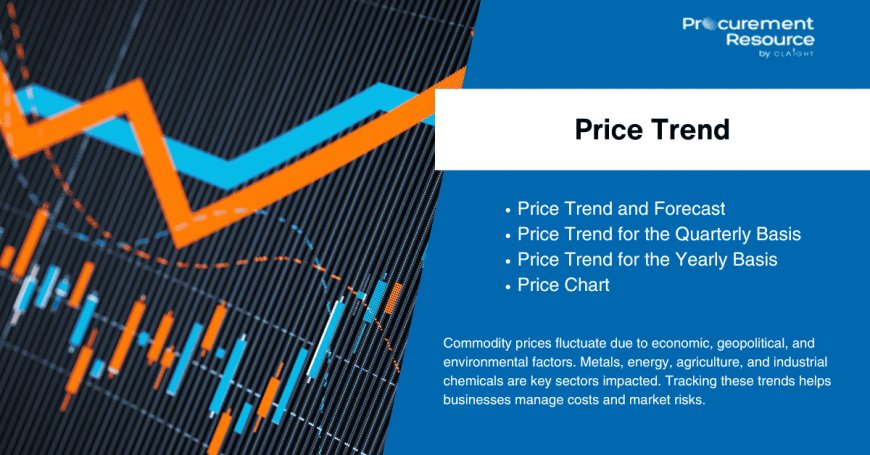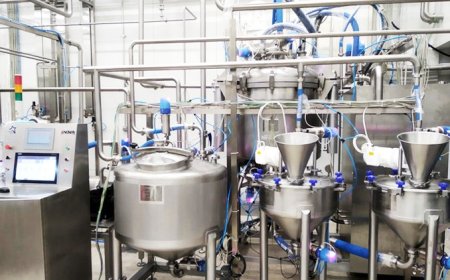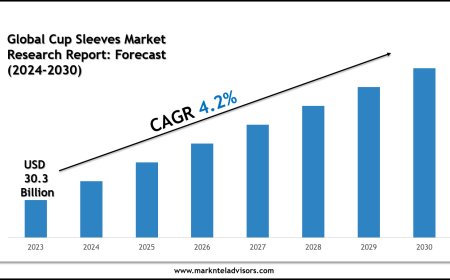Kerosene Prices Chart: Trends, Analysis, and Forecast Insights
This in-depth article explores the current kerosene price trends, charts, market forecasts, regional dynamics, and more.

Kerosene remains a crucial fuel source globally, used in aviation, domestic heating, lighting, and even industrial processes in regions where other fuels are inaccessible or expensive. With fluctuating global energy dynamics, the kerosene market is experiencing continued volatility, driven by shifts in crude oil prices, regional demand, refining capacity, and geopolitical factors.
This in-depth article explores the current kerosene price trends, market forecasts, regional dynamics, and more. For analysts, procurement managers, and energy sector professionals, understanding the evolving pricing of kerosene is essential. A comprehensive Kerosene price chart is also included to help visualize historical trends and anticipate future movements.
Latest Kerosene Prices: Market Update
The global kerosene market is intrinsically linked to the upstream crude oil supply chain. As a refined petroleum product, kerosene prices are shaped by fluctuations in Brent and WTI benchmarks, refinery output rates, and regional regulations.
Recent months have seen price shifts due to:
- OPEC+ production adjustments
- Increased global travel (aviation-grade kerosene demand)
- Seasonal heating needs in colder regions
- Feedstock constraints and shipping bottlenecks
Despite diversification in energy sources, kerosene remains indispensable in many low-income or rural areas. In aviation, Jet A and Jet A-1 (types of kerosene) continue to dominate global flight fuel needs.
Market Analysis: Whats Driving Kerosene Prices?
Several factors influence the kerosene market:
1. Crude Oil Benchmarks
Kerosene, like other refined fuels, is impacted directly by crude oil prices. Rising Brent and WTI prices elevate refining costs and output margins, pushing kerosene prices higher.
2. Seasonal Demand
Colder months often lead to a spike in kerosene demand for domestic heating, especially in regions with limited access to natural gas or electric heating systems.
3. Aviation Sector
A rebound in global air travel post-pandemic has reignited demand for aviation kerosene, adding upward pressure on prices in major airports and transit hubs.
4. Geopolitical Events
Conflicts, sanctions, and trade restrictions affect global oil movement, refining logistics, and ultimately the regional availability of kerosene.
Kerosene Price Chart and Historical Trends
Understanding historical pricing is essential for strategic procurement, budgeting, and investment planning. The Kerosene price chart provides a clear visualization of how prices have changed over time due to macroeconomic factors and supply-demand variations.
Key Historical Insights:
- Stable pricing with moderate seasonal fluctuations
- Major price dip due to COVID-19 and suppressed aviation demand
- Sharp rebound as economies reopened and energy markets adjusted to geopolitical tensions
- Stabilizing trends with regional fluctuations, particularly in Asia and Africa
These trends offer critical benchmarks for buyers, traders, and energy analysts, allowing them to forecast future pricing and secure better purchasing terms.
Historical Data & Forecasts
Extensive historical kerosene price data helps identify cyclical trends and develop predictive models. This information is vital for:
- Long-term procurement planning
- Energy cost modeling
- Contract price indexing
Forecast Overview:
The kerosene market is expected to remain moderately bullish in the coming years, influenced by:
- Expansion of global air traffic
- Decentralized rural energy usage
- Limited refinery upgrades for middle distillates
- Policy-driven shifts toward cleaner fuels
However, demand-side uncertainty related to alternative energy adoption and electrification could introduce downward price pressure in the long term.
Regional Insights and Market Dynamics
Asia-Pacific
Home to some of the largest kerosene-consuming nations such as India, Indonesia, and China, this region sees strong demand for domestic and commercial kerosene use. Seasonal demand is pronounced, and government subsidies often influence pricing trends.
Middle East & Africa
Many areas in Africa still rely heavily on kerosene for lighting and cooking. Meanwhile, the Middle East, a major refining hub, continues to supply global markets with competitively priced kerosene despite supply chain disruptions.
North America
The U.S. sees limited kerosene usage for heating in rural regions, with aviation fuel representing the largest demand segment. Market dynamics here are closely linked to jet fuel consumption and seasonal weather changes.
Europe
With declining residential kerosene use, European demand is mostly commercial and aviation-related. Regulatory frameworks promoting cleaner energy sources are also reshaping kerosene consumption patterns.
Kerosene Market News & Developments
Staying updated on market developments is vital for energy buyers and suppliers. Key recent developments include:
- New refining investments in the Middle East and Asia: Boosting kerosene output, particularly for aviation-grade fuels
- Energy transition policies: Governments are gradually reducing kerosene subsidies to encourage greener alternatives
- Supply chain adjustments: Post-COVID logistics strategies are reshaping how kerosene is stored and distributed globally
- Global conflicts: Regional disruptions continue to affect shipping routes, freight costs, and delivery timelines
Monitoring these market signals is crucial for anticipating price movement and managing procurement risks.
Procurement Intelligence for Kerosene
Procurement Resource offers comprehensive market intelligence that supports informed buying decisions across energy sectors. Their kerosene procurement reports include:
- Cost structure analysis
- Key supplier and refinery profiles
- Market entry risks
- Price forecasting models
- Regional supply and demand matrices
Armed with Procurement Resources insights, businesses can implement cost-saving strategies, secure better contracts, and reduce exposure to price fluctuations.
Kerosene Market Database & Analytics
To stay competitive, companies need access to a robust kerosene pricing database, which offers:
- Daily, weekly, and monthly kerosene price indices
- Refinery production volumes by region
- Import/export data by country
- Fuel blend specifications and compliance tracking
Integrating this data with modern analytics tools allows for real-time trend identification, predictive modeling, and procurement optimization. Customized dashboards can also help procurement teams compare suppliers, evaluate sourcing risks, and improve negotiation leverage.
Request for the Real Time Prices : https://www.procurementresource.com/resource-center/kerosene-price-trends/pricerequest
Contact Information
Company Name: Procurement Resource
Contact Person: Ashish Sharma (Sales Representative)
Email: sales@procurementresource.com
Location: 30 North Gould Street, Sheridan, WY 82801, USA
Phone:
UK: +44 7537171117
USA: +1 307 363 1045
Asia-Pacific (APAC): +91 1203185500
Connect With Us Online:
https://www.linkedin.com/company/procurement-resource-official/


































